2024年中考英语专项复习模块三-时态和语态:1. 一般现在时vs一般过去时 课件(共28张PPT)
文档属性
| 名称 | 2024年中考英语专项复习模块三-时态和语态:1. 一般现在时vs一般过去时 课件(共28张PPT) |

|
|
| 格式 | pptx | ||
| 文件大小 | 20.4MB | ||
| 资源类型 | 教案 | ||
| 版本资源 | 人教新目标(Go for it)版 | ||
| 科目 | 英语 | ||
| 更新时间 | 2023-08-22 00:00:00 | ||
图片预览

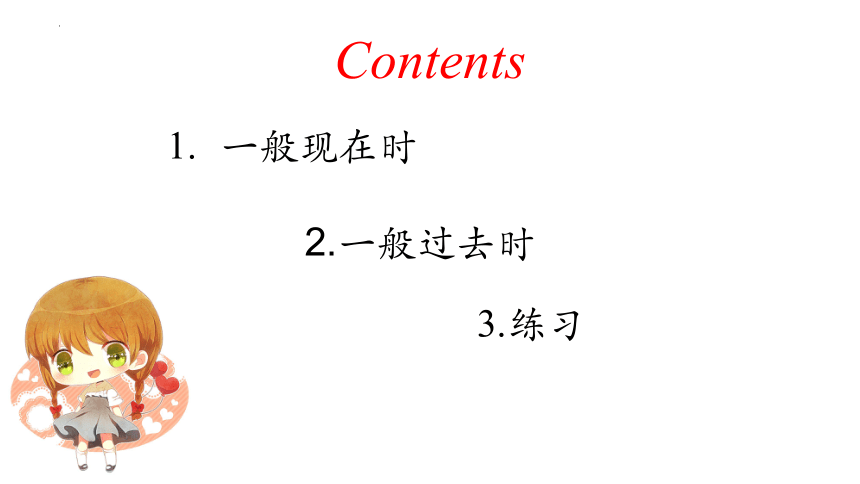
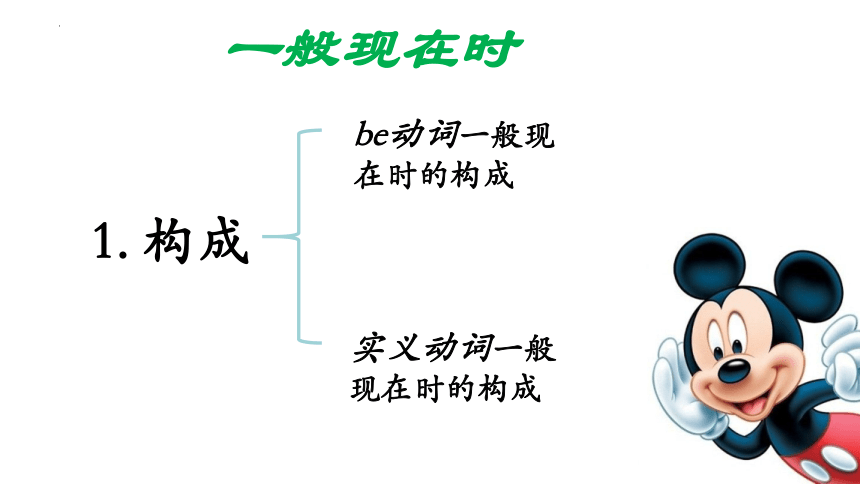
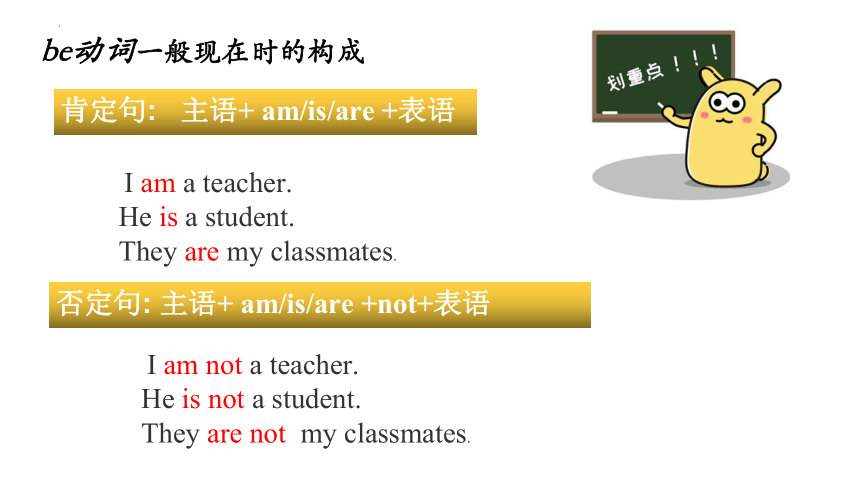
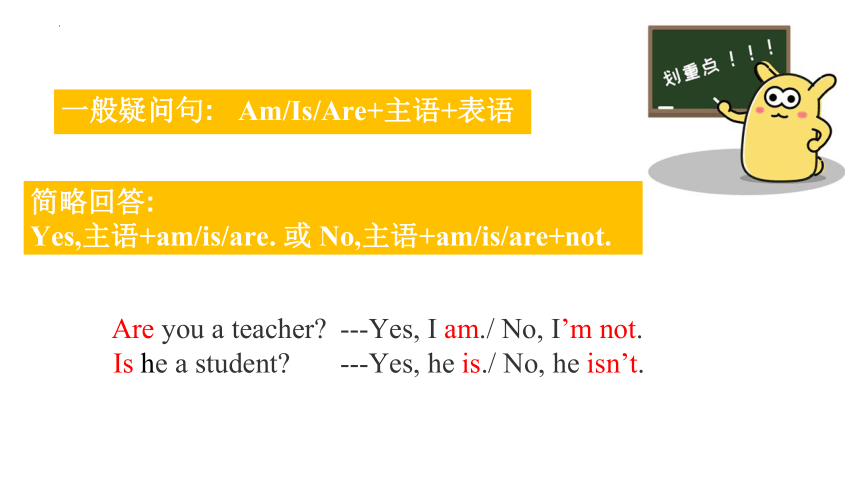
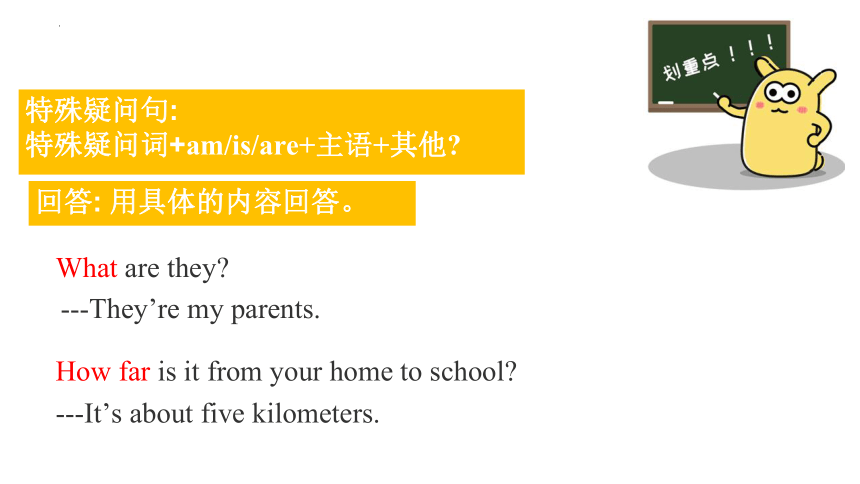
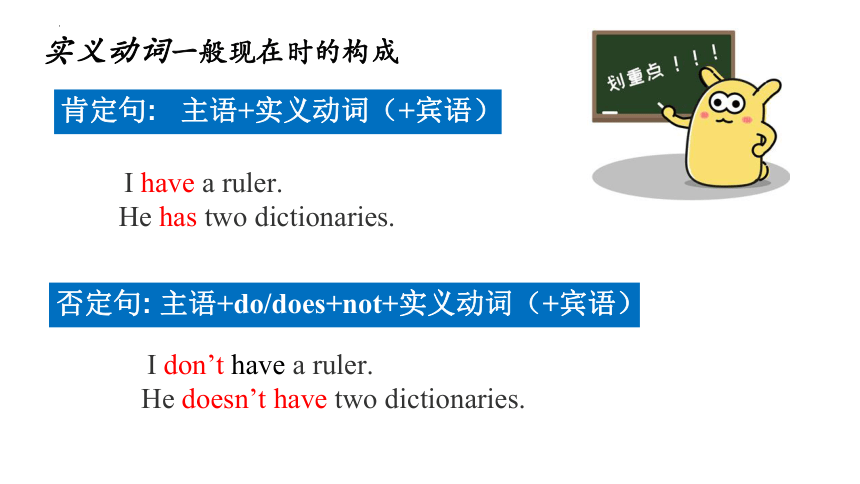
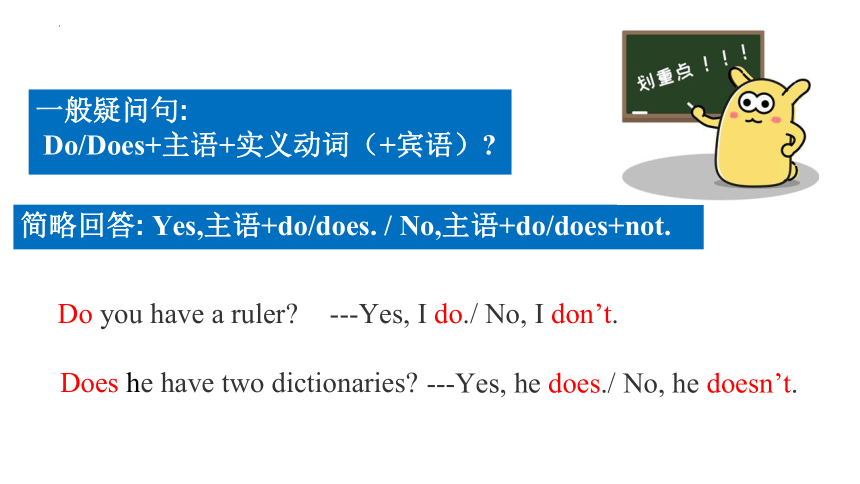
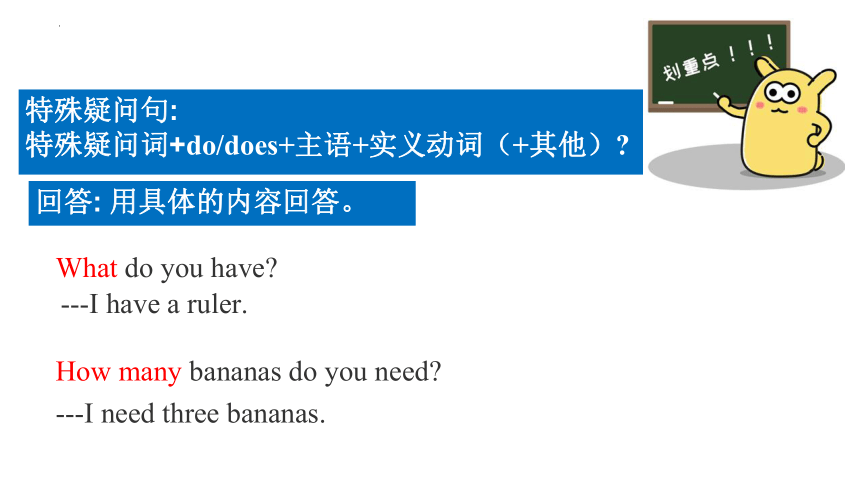
文档简介
(共28张PPT)
中考复习
一般现在时VS一般过去时
Contents
2.一般过去时
3.练习
一般现在时
1. 构成
be动词一般现在时的构成
实义动词一般现在时的构成
一般现在时
be动词一般现在时的构成
肯定句: 主语+ am/is/are +表语
I am a teacher.
He is a student.
They are my classmates.
否定句: 主语+ am/is/are +not+表语
I am not a teacher.
He is not a student.
They are not my classmates.
一般疑问句: Am/Is/Are+主语+表语
Are you a teacher
Is he a student
简略回答:
Yes,主语+am/is/are. 或 No,主语+am/is/are+not.
---Yes, I am./ No, I’m not.
---Yes, he is./ No, he isn’t.
特殊疑问句:
特殊疑问词+am/is/are+主语+其他
What are they
How far is it from your home to school
---It’s about five kilometers.
回答: 用具体的内容回答。
---They’re my parents.
实义动词一般现在时的构成
肯定句: 主语+实义动词(+宾语)
I have a ruler.
He has two dictionaries.
否定句: 主语+do/does+not+实义动词(+宾语)
I don’t have a ruler.
He doesn’t have two dictionaries.
一般疑问句:
Do/Does+主语+实义动词(+宾语)
Do you have a ruler
Does he have two dictionaries
简略回答: Yes,主语+do/does. / No,主语+do/does+not.
---Yes, he does./ No, he doesn’t.
---Yes, I do./ No, I don’t.
特殊疑问句:
特殊疑问词+do/does+主语+实义动词(+其他)
What do you have
How many bananas do you need
---I need three bananas.
---I have a ruler.
回答: 用具体的内容回答。
2. 用法
表示客观真理或事实
一般现在时
表示现在经常发生的或习惯性动作
表示现在的情况或状态
表示按计划、按规定或按时间表等预计要发生的动作或状态
表示将来的时间
表示客观真理或事实
The sun rises from the east.
The Nile is the longest river in the world.
表示现在经常发生的或习惯性动作
He usually gets up at 7 o’clock.
She often eats ice-cream after dinner.
这一用法经常与always, usually, often, every day, never, sometimes等表示时间的词连用。
表示现在的情况或状态
表示按计划、按规定或按时间表等预计要发生的动作或状态
Both of my brothers are policemen.
Her watch doesn’t work.
The train leaves at 9:30.
His father retires next month.
这一用法往往只限于某些表示“离开,来,去,停止,开始”等意义的词,如:arrive, leave, come, take off, begin等。
表示将来的时间(在时间或条件状语从句中)
As soon as he finds the key, he will call you.
If I get the first prize, my parents will buy a computer for me.
1. 构成
be动词一般过去时的构成
实义动词一般过去时的构成
一般过去时
肯定句: 主语+ was/were +表语.
否定句: 主语+ was/were +not+表语.
.
be动词一般过去时的构成
I was a teacher.
He was a student.
They were my classmates.
I wasn’t a teacher.
He wasn’t a student.
They weren’t my classmates.
一般疑问句: Was/Were+主语+表语
Were you a teacher
Was he a student
简略回答:
Yes,主语+was/were. 或 No,主语+was/were+not.
--Yes, he was./ No, he wasn’t.
--Yes, I was./ No, I wasn’t.
特殊疑问句:
特殊疑问词+was/were+主语+其他
What were they
Where was your sister last month
---She was in Beijing.
回答: 用具体的内容回答。
---They were singers.
实义动词一般过去时的构成
肯定句: 主语+动词过去式(+宾语).
I had a ruler.
He worked in a factory.
否定句: 主语+did+not+动词原形(+宾语).
I didn’t have a ruler.
He didn’t work in a factory.
一般疑问句:
Did+主语++动词原形(+宾语)
Did you have a ruler
Did he work in a factory
简略回答: Yes,主语+did. 或 No,主语+didn’t.
---Yes, he did./ No, he didn’t.
---Yes, I did./ No, I didn’t.
特殊疑问句:
特殊疑问词+did+主语+动词原形(+其他)
What did you have
How many bananas did you need
---I needed three bananas.
---I had a ruler.
回答: 用具体的内容回答。
2. 用法
一般过去时
表示过去一段时间经常或反复发生的动作或过去的习惯性动作
表示在过去时间中一次性完成的动作或一度存在的状态
表示在过去时间中一次性完成的动作或一度存在的状态
My daughter graduated from middle school two years ago.
He was an engineer when he was young.
Bill and Tom played football yesterday afternoon.
这一用法常与表示过去时间的词连用,如:yesterday, last night, two years ago, just now, in 1997等
表示过去一段时间经常或反复发生的动作或过去的习惯性动作
The doctor usually arrived at his office at 7:30.
She often went shopping on weekends.
They never talked to each other.
We would ask the teacher for help sometimes.
I used to eat an egg for breakfast.
would和used to 常用于表示过去习惯性动作。
这一用法常与always, usually, often, never, sometimes等表示频度的词连用。
练习
1. I _____ you yesterday evening, but you _______not in.
A. visit; are B. visited; were C. visit; were D. visits; are
2. —When shall we start our meeting
—We’ll begin it when Helen ______.
A. come B. will come C.comes D. came
3. He _____ listening to music.
A. like B. likes C. liking D.is liking
4. A little bird _______ in through the open wondow and she set it free.
A. fly B. flying C. flied D. flew
5. Uncle Wang _____ two watsches for me yesterday.
A. buy B. buys C. buying D. brought
6. ---What club ______ your friend want to join
---He ______ to join the sports club.
A. do; wants B. does; wants C. do; want D. does; want
7. Students often ____ many problems.
A. have B. having C. had D. has
8. ---What ____ you do last weekend
---I _____ my room.
A. did; clean B.do; cleaned C. did; cleaned D. does; clean
9. Some Germans ______ to our school for a visit that day.
A. came B. come C. coming D. have came
10. --- What time did you usually ______ a shower
----I usually _____ a shower in the morning.
A. take; take B. taking;takes C. took;took D.take; took
11. ---How long does it ______ you to get to school
---It takes me ten minutes.
A.takes B. take C. taking D. took
12.---How ____ your father go to work
---He _____ to work by car.
A.do; go B.do;goes C.does;goes D. does; go
13. I ____ you last night, but you didn’t _______ up the phone.
A. call; pick B.called; picked C. call; pick D. called; pick
14. The train ______ at the station in ten minutes.
A. arrives B.is arriving C. arrive D. arrived
15. ---Where _____ you live ten years ago
---I _____ in a small town.
A. do; live B.do; lived C. did; lived D. did; live
Thank you!
中考复习
一般现在时VS一般过去时
Contents
2.一般过去时
3.练习
一般现在时
1. 构成
be动词一般现在时的构成
实义动词一般现在时的构成
一般现在时
be动词一般现在时的构成
肯定句: 主语+ am/is/are +表语
I am a teacher.
He is a student.
They are my classmates.
否定句: 主语+ am/is/are +not+表语
I am not a teacher.
He is not a student.
They are not my classmates.
一般疑问句: Am/Is/Are+主语+表语
Are you a teacher
Is he a student
简略回答:
Yes,主语+am/is/are. 或 No,主语+am/is/are+not.
---Yes, I am./ No, I’m not.
---Yes, he is./ No, he isn’t.
特殊疑问句:
特殊疑问词+am/is/are+主语+其他
What are they
How far is it from your home to school
---It’s about five kilometers.
回答: 用具体的内容回答。
---They’re my parents.
实义动词一般现在时的构成
肯定句: 主语+实义动词(+宾语)
I have a ruler.
He has two dictionaries.
否定句: 主语+do/does+not+实义动词(+宾语)
I don’t have a ruler.
He doesn’t have two dictionaries.
一般疑问句:
Do/Does+主语+实义动词(+宾语)
Do you have a ruler
Does he have two dictionaries
简略回答: Yes,主语+do/does. / No,主语+do/does+not.
---Yes, he does./ No, he doesn’t.
---Yes, I do./ No, I don’t.
特殊疑问句:
特殊疑问词+do/does+主语+实义动词(+其他)
What do you have
How many bananas do you need
---I need three bananas.
---I have a ruler.
回答: 用具体的内容回答。
2. 用法
表示客观真理或事实
一般现在时
表示现在经常发生的或习惯性动作
表示现在的情况或状态
表示按计划、按规定或按时间表等预计要发生的动作或状态
表示将来的时间
表示客观真理或事实
The sun rises from the east.
The Nile is the longest river in the world.
表示现在经常发生的或习惯性动作
He usually gets up at 7 o’clock.
She often eats ice-cream after dinner.
这一用法经常与always, usually, often, every day, never, sometimes等表示时间的词连用。
表示现在的情况或状态
表示按计划、按规定或按时间表等预计要发生的动作或状态
Both of my brothers are policemen.
Her watch doesn’t work.
The train leaves at 9:30.
His father retires next month.
这一用法往往只限于某些表示“离开,来,去,停止,开始”等意义的词,如:arrive, leave, come, take off, begin等。
表示将来的时间(在时间或条件状语从句中)
As soon as he finds the key, he will call you.
If I get the first prize, my parents will buy a computer for me.
1. 构成
be动词一般过去时的构成
实义动词一般过去时的构成
一般过去时
肯定句: 主语+ was/were +表语.
否定句: 主语+ was/were +not+表语.
.
be动词一般过去时的构成
I was a teacher.
He was a student.
They were my classmates.
I wasn’t a teacher.
He wasn’t a student.
They weren’t my classmates.
一般疑问句: Was/Were+主语+表语
Were you a teacher
Was he a student
简略回答:
Yes,主语+was/were. 或 No,主语+was/were+not.
--Yes, he was./ No, he wasn’t.
--Yes, I was./ No, I wasn’t.
特殊疑问句:
特殊疑问词+was/were+主语+其他
What were they
Where was your sister last month
---She was in Beijing.
回答: 用具体的内容回答。
---They were singers.
实义动词一般过去时的构成
肯定句: 主语+动词过去式(+宾语).
I had a ruler.
He worked in a factory.
否定句: 主语+did+not+动词原形(+宾语).
I didn’t have a ruler.
He didn’t work in a factory.
一般疑问句:
Did+主语++动词原形(+宾语)
Did you have a ruler
Did he work in a factory
简略回答: Yes,主语+did. 或 No,主语+didn’t.
---Yes, he did./ No, he didn’t.
---Yes, I did./ No, I didn’t.
特殊疑问句:
特殊疑问词+did+主语+动词原形(+其他)
What did you have
How many bananas did you need
---I needed three bananas.
---I had a ruler.
回答: 用具体的内容回答。
2. 用法
一般过去时
表示过去一段时间经常或反复发生的动作或过去的习惯性动作
表示在过去时间中一次性完成的动作或一度存在的状态
表示在过去时间中一次性完成的动作或一度存在的状态
My daughter graduated from middle school two years ago.
He was an engineer when he was young.
Bill and Tom played football yesterday afternoon.
这一用法常与表示过去时间的词连用,如:yesterday, last night, two years ago, just now, in 1997等
表示过去一段时间经常或反复发生的动作或过去的习惯性动作
The doctor usually arrived at his office at 7:30.
She often went shopping on weekends.
They never talked to each other.
We would ask the teacher for help sometimes.
I used to eat an egg for breakfast.
would和used to 常用于表示过去习惯性动作。
这一用法常与always, usually, often, never, sometimes等表示频度的词连用。
练习
1. I _____ you yesterday evening, but you _______not in.
A. visit; are B. visited; were C. visit; were D. visits; are
2. —When shall we start our meeting
—We’ll begin it when Helen ______.
A. come B. will come C.comes D. came
3. He _____ listening to music.
A. like B. likes C. liking D.is liking
4. A little bird _______ in through the open wondow and she set it free.
A. fly B. flying C. flied D. flew
5. Uncle Wang _____ two watsches for me yesterday.
A. buy B. buys C. buying D. brought
6. ---What club ______ your friend want to join
---He ______ to join the sports club.
A. do; wants B. does; wants C. do; want D. does; want
7. Students often ____ many problems.
A. have B. having C. had D. has
8. ---What ____ you do last weekend
---I _____ my room.
A. did; clean B.do; cleaned C. did; cleaned D. does; clean
9. Some Germans ______ to our school for a visit that day.
A. came B. come C. coming D. have came
10. --- What time did you usually ______ a shower
----I usually _____ a shower in the morning.
A. take; take B. taking;takes C. took;took D.take; took
11. ---How long does it ______ you to get to school
---It takes me ten minutes.
A.takes B. take C. taking D. took
12.---How ____ your father go to work
---He _____ to work by car.
A.do; go B.do;goes C.does;goes D. does; go
13. I ____ you last night, but you didn’t _______ up the phone.
A. call; pick B.called; picked C. call; pick D. called; pick
14. The train ______ at the station in ten minutes.
A. arrives B.is arriving C. arrive D. arrived
15. ---Where _____ you live ten years ago
---I _____ in a small town.
A. do; live B.do; lived C. did; lived D. did; live
Thank you!
